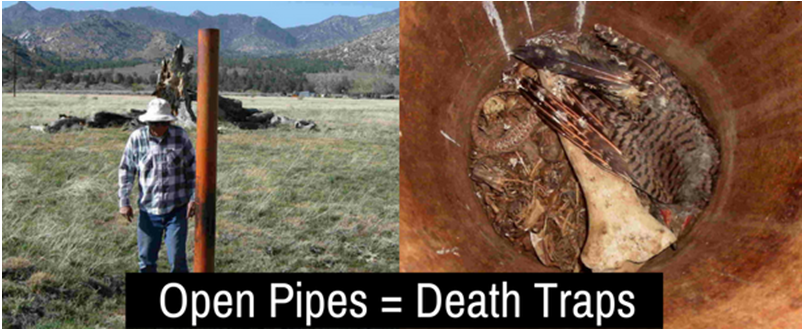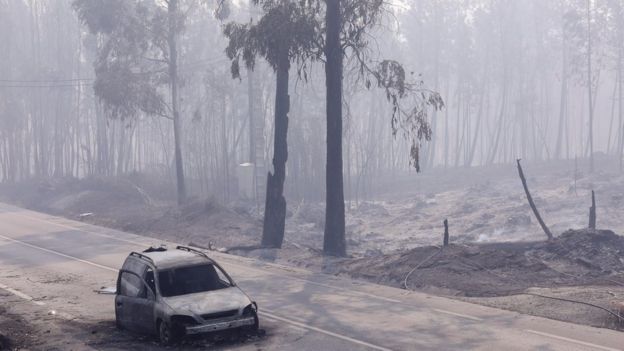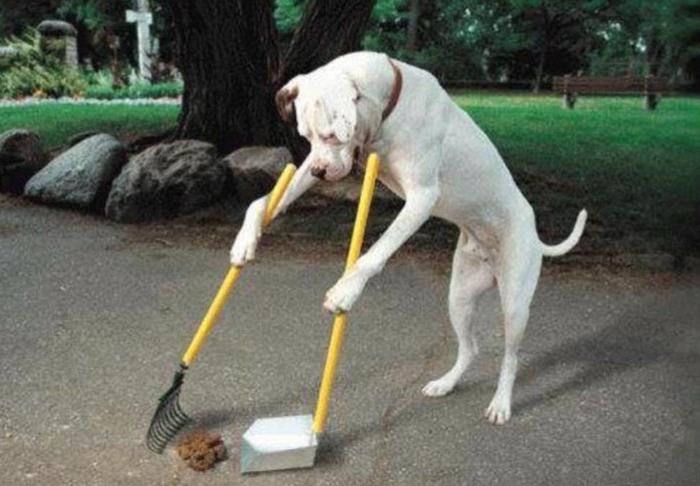Open-top Vertical Pipes
There is a wide-spread threat to birds and other wildlife which has long gone unnoticed: open-topped vertical pipes. The animals explore them for nesting potential, then get stuck in them and die of any of the various causes one may die of when stuck in a vertical pipe.

Any pipe from 1 to 12 inches in diameter is a potential trap. There are myriads of such pipes, from fence and sign posts to exhaust pipes on buildings. The Pima County Office of Sustainability and Conservation appeals to property owners to identify and cover such pipes on their property. If it is not an exhaust or other flow-pipe, it can be closed off with dirt and rocks. If it is a flow pipe, it can be closed off with a bit of mesh and a clamp ring.
The Office is working constantly to identify and map such pipes on public land and welcomes any reports from the public. The Office emphasizes that property rights should be respected and that members of the public should not go out on their own to alter or remove pipes if not on their property. If you see any on County property, contact Ian Murray at 520-724-9489 or by email at [email protected]. If you see them on federal land, contact the U.S. Forest Service or the Bureau of Land Management.
Sparks Are Flying

It is that time of year when we make covetous eyes at the slightest cumulus for rain and relief from the heat. Summer officially started on Tuesday, but was actually already in full swing by then. Perhaps the season should rather be called ‘simmer’, considering the record heat. And it’s not just us. Temperatures are going through the roof on every continent, including Antarctica. Eastern Africa is especially hard hit, but Europe also sighs under unprecedented heat again this year. The resulting drought caused a huge wildfire in Portugal, killing over sixty people, many of them trapped in their cars while fleeing. All it takes is one small spark when the land is like a tinderbox, as ours is too.
In this context, the Pima County Board of Supervisors has passed a resolution to comply with the Paris Climate Accord in opposition to President’s Trump’s intention to abandon the treaty. The Paris Climate Accord aims to keep the global rise in temperature under 3.7 º Fahrenheit by the end of the century. That would make an estimated difference of about 10º in our neck of the woods, which could well be all the difference. A similar resolution is before the Tucson City Council.
Scoop The Poop

Normally, the monsoon should come in by the end of the week and the clouds are already gathering. It will bring relief, but also some environmental concerns. One of them is dog doo. When the doo gets swept away by stormwater and enters the watershed, it becomes a serious health hazard. The excrement of carnivores contains a nasty mix of disease-carrying organisms. If all that ends up in the water, it is a threat to anything sharing that water, our wildlife, our native plants and any of our children that like to play in puddles. Therefore, the Pima County Department of Environmental Quality is reaching out to pet owners to ‘Scoop the Poop‘, especially during the monsoon, and dispose of it properly.
Doos And Doonots
That brings up the question: what is proper doo disposal. Bagging it in plastic bags and throwing it in the trash will put it in the landfill, plastic bag and all. After the bag has finally disintegrated, its inhabitants will probably just be working on their billionth generation and happy to be set free again. Paper bags are always preferable over plastic ones, but those would just release the critters a bit earlier. So the landfill is not the place for it. Composting is not an option either, because the temperature in a compost heap does not get high enough to kill these organisms.
The best way to dispose of pooch doo is actually the most obvious one: flush it down the toilet. Then it will end up at the wastewater treatment plant, which none of the critters will leave alive. The question then is how to get it from the drop site to the bowl. There are bags made of water-soluble material, but they are rather expensive. There is of course the pooper scooper, but those are not ideal for carrying substances over long distances, even leaving out the embarrassment factor. A small bucket is probably the best solution. It may get a little gross, especially if your pooch has an intestinal problem, but then again, love means sacrifice.
(Broadcast 4:52)
The Weekly Green airs on Monday 5:55 PM, Tuesday 4:55 AM, Wednesday 9:55 AM & 5:55 PM, Thursday 7:55 PM and Saturday 9:55 AM. First airing is usually at 10 am on Wednesday.
Please email inquiries, suggestions and comments to The[email protected] or post them on the Weekly Green Facebook page.

